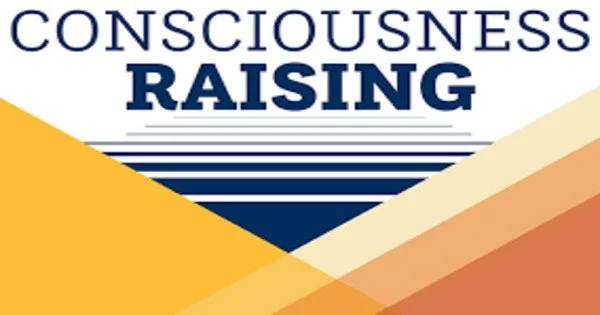Consciousness raising (also known as awareness raising) is a type of activism popularised by feminists in the United States in the late 1960s. It frequently takes the form of a small group of people striving to draw the attention of a larger group to a certain problem or condition. It refers to the process of raising consciousness and knowledge of social, political, or personal concerns affecting individuals or specific groups of people. The purpose of raising consciousness is to promote critical thinking, self-reflection, and solidarity among people who have comparable experiences or problems.
Diseases (e.g., breast cancer, AIDS), wars (e.g., the Darfur massacre, global warming), movements (e.g., Greenpeace, PETA, Earth Hour), and political parties or politicians are all common topics. Raising awareness is often the first action in which any advocacy group engages since alerting the populace of a public concern is often considered as the first step in influencing how institutions handle it.
Since then, the notion of awareness-raising has been extended to a variety of social justice initiatives, encouraging marginalized people to investigate and discuss their shared experiences, challenges, and goals. It helps people see how their own challenges are linked to larger social issues, establishing a feeling of communal identity and encouraging collective action.
However, in practice, raising awareness is often combined with other activities, such as fundraising, membership drives or advocacy, in order to harness and/or sustain the motivation of new supporters which may be at its highest just after they have learned and digested the new information.
Key features of consciousness-raising include:
- Sharing personal experiences: Participants share their individual stories, allowing them to understand that their struggles are not isolated incidents but part of larger patterns.
- Analyzing power structures: The discussions involve analyzing societal structures, cultural norms, and power dynamics that perpetuate injustice and oppression.
- Building empathy and solidarity: By listening to others’ experiences, participants develop empathy and a sense of solidarity with those facing similar challenges.
- Recognizing intersectionality: Consciousness raising often addresses the interconnectedness of various forms of oppression, such as gender, race, class, sexuality, and more.
- Empowerment for action: Through increased awareness and understanding, participants are encouraged to take action to address the issues they’ve discussed, both on personal and collective levels.
To counteract stereotypes, prejudices, and harmful practises towards persons with disabilities, the word “awareness raising” is used in the Yogyakarta Principles against discriminatory attitudes and LGBT stereotypes, as well as the Convention on the Rights of Persons with Disabilities.
Raising consciousness has proven to be an effective method for creating social change and activism, promoting inclusivity, and fighting repressive structures. It continues to play an important role in empowering individuals and communities to recognise and oppose inequity, prejudice, and injustice in a variety of circumstances.















